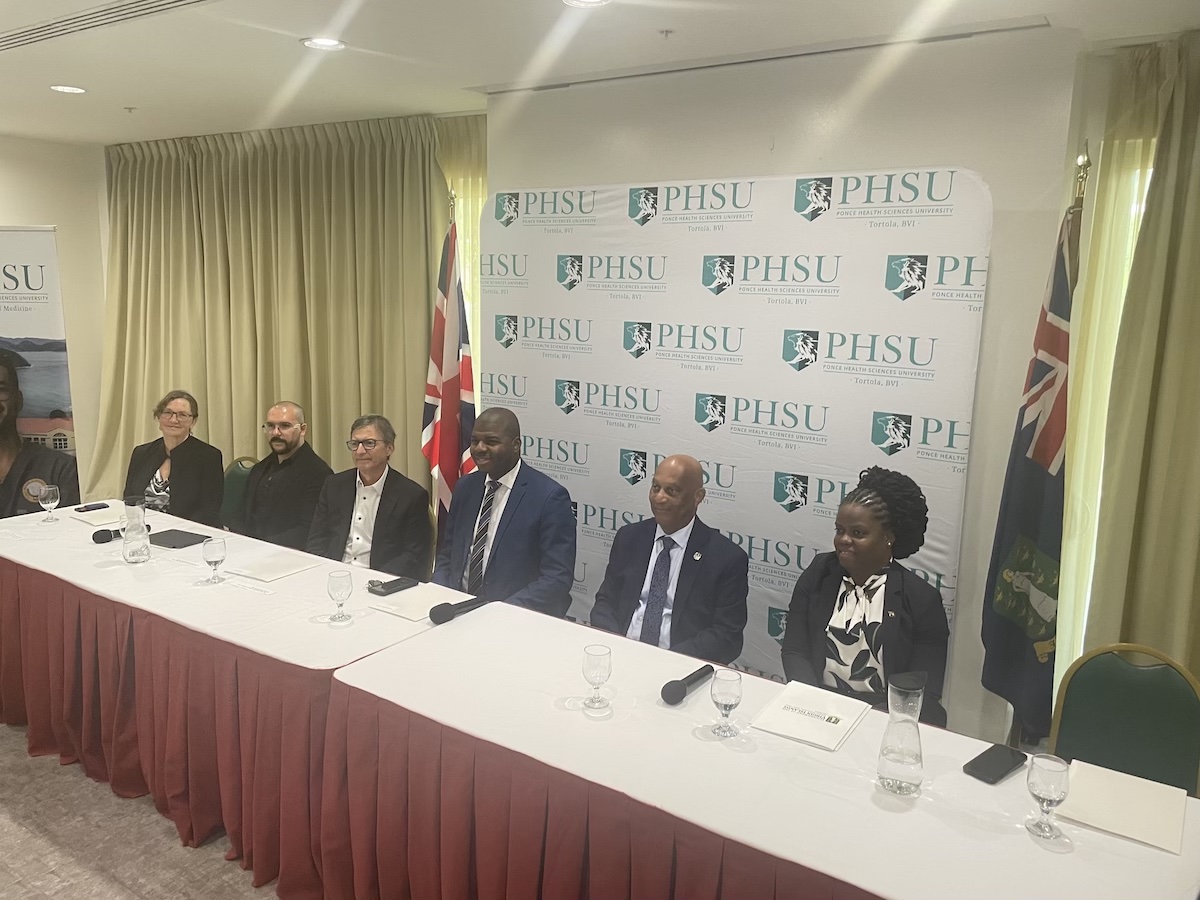

Classes for the first medical school in the Virgin Islands are set to begin July 28, university executives and government officials announced during a Monday press conference where they unveiled their latest plans for the project.
Students at the Tortola campus of the Ponce Health Sciences University School of Medicine will live on the island and attend classes and labs here for the first two years of the four-year programme, school officials said.
For the remaining two years, they will complete clinical rotations on one of the three affiliate PHSU campus in Puerto Rico or the mainland US.
PHSU President Gino Natalicchio explained during the press conference that this arrangement is due to a “regulatory issue:” The accrediting bodies the school is using — the US-based Middle States Commission on Higher Education (MSCHE) and the Ireland-based Accreditation Commission on Colleges of Medicine (ACCM) — require students to complete two years of their education in the US or a US territory, he explained.
The Tortola medical school already has a provisional accreditation from ACCM — a body that accredits several medical schools in the Caribbean — as well as an accreditation from the MSCHE, according to the school.
Additionally, the school has a provisional licence from the Higher Education Licensing Board under the VI’s Ministry of Education, Youth Affairs and Sports, according to the school.
School officials said they have received more than 900 applications so far, and 38 of the 50 spots have been filled for the inaugural class.
Currently, 60 percent of the accepted students are from the mainland US, 35 percent are from Puerto Rico, and five percent are from other countries, with one student from the VI.
Two students who are Virgin Islanders or belongers will be awarded a full tuition scholarship, according to school and government officials.
Housing
Leading up to the July launch, the school is working with the VI government to find housing for the students and faculty, officials said.
As part of those efforts, the Social Security Board and the school are in discussions to rent out units from the Joes Hill Manor Estate housing project, according to panelists at Monday’s press conference.
Premier Natalio “Sowande” Wheatley spoke of the importance of finding housing and said that the situation at Joes Hill worked out well.
“If we weren’t able to present good quality housing for these students, this would not have been a reality,” he said.
Most of the condominiums at Joes Hill have sat empty since the SSB began marketing them in mid-2022. The agency initially billed the project as “affordable housing,” but it has struggled to sell the 52 units, some of which have been affected by landslides and a collapsed parking lot during heavy rains.
The premier added Monday that there will be a need for more housing space for students in the future as the school grows.
Economic boost
Mr. Wheatley, who was joined by Education, Youth Affairs and Sports Minister Sharie de Castro and Health and Social Development Minister Vincent Wheatley, echoed the PHSU executives’ point that the school will bring a boost to the VI’s economy.
“Persons shouldn’t underestimate the type of impact this has on a society, and of course PHSU has made a major investment and they’re here to stay,” Mr. Wheatley said.
Dr. E. Anne Peterson, the dean of PHSU’s Tortola branch, emphasised the school’s intention to work with the wider medical community in the territory.
“We hope to become an integral part of the medical community, sharing what we know, learning from the BVI and building a stronger medical community in the BVI as well,” she said. “We hope that our students, as happens at the other campuses, will participate in community health events and screenings and contribute and get to know the community.”
Equipment
The school is outfitting a dry lab in the B&F Medical Complex in Road Town and will also hold classes in four classrooms at the H. Lavity Stoutt Community College, officials said.
“So this dry lab will combine different methodologies, including virtual reality,” said Dr. José Pérez, the vice president of operations for PHSU’s VI school.
Rather than undertaking wetlab work such as dissecting cadavers, Dr. Pérez said that students will learn in a “controlled space where they can practise using really high technology equipment that will represent real patients.”
He added that students will also learn through an Objective Structured Clinical Examination programme, also known as OSCE.
“They are done with standardised stations [with] people who are actors that represent diseases in order to allow our students to be able to practise and learn in a controlled environment and without being able to hurt or do some damage to real patients,” he said.
The necessary equipment has been purchased, and it is expected to arrive in the territory within the next two months, Dr. Pérez said.




